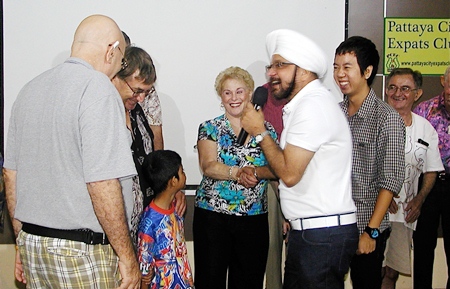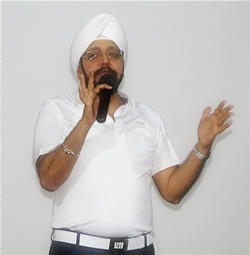Thailand has three New Year Celebrations each year. The first is January 1, which is celebrated in most parts of the world. The second is the Chinese New Year, which is based on a date (lunar) that usually falls in February. The third is the Thai New Year known as Songkran. It is celebrated in April over a 3 day period in most of Thailand; also known as the water festival. Traditional Songkran celebration involves the pouring of water over the hands of one’s elders. However, most expats and tourists know it as the water throwing festival where all and sundry that dare to go out are doused with water and powder.
For the past 4 years, the Pattaya City Expats Club has set aside a regular Sunday meeting in April to carry out a traditional Songkran ceremony. This year the chosen date was the Club’s meeting at the Amari’s Tavern by the Sea on April 17, 2011. This date fell between the 3 day official celebration time and the dates designated by Naklua and Pattaya for their celebrations. As is typical each year, the Thais and tourists start the water throwing on the first official day and continue through the days set aside by Naklua and Pattaya. Whereas the Club’s attendance at a Sunday meeting is around 120, there were only 48 brave souls that ventured out at the risk of being drenched to attend the Club’s ceremony.
 The delightful staff of the Amari’s Tavern by the Sea were dressed in their Songkran finest to welcome members & guests to the Pattaya City Expats Songkran ceremony.
The delightful staff of the Amari’s Tavern by the Sea were dressed in their Songkran finest to welcome members & guests to the Pattaya City Expats Songkran ceremony.
Members and guests were met at the door by Amari staff, in traditional Thai dress, where they were given the opportunity to pour lustral water over a Buddha statue placed at the entrance. The meeting started with member Richard Smith inviting two honored guests to join him and three other members to be seated at a front table that had been prepared for the ceremony. The honored guests were Khun Prateep, Deputy Governor of Trat Province, and Khun Mongol, Nai Amphur (District Chief) of Banglamung.
After all these “elders” were seated, the ceremony began. Members and guests formed a line and proceeded past the “elders,” washing their hands with lustral water and wishing them well; receiving similar wishes in return. Khun Toy from Pattaya Orphanage, who with two of her young charges wearing traditional Thai dresses, also honored the “elders.” Even Amari’s wait staff and kitchen staff joined the line to honor the “elders.”
 Some of the attendees at this year’s Songkran. Seated in front from left are Prateep, former nai amphur of Banglamung and now deputy governor of Trat; Mongkol, current nai amphur of Banglamung; PCEC chairman Michel, board member Judith, member John, board member & former chairman Richard.
Some of the attendees at this year’s Songkran. Seated in front from left are Prateep, former nai amphur of Banglamung and now deputy governor of Trat; Mongkol, current nai amphur of Banglamung; PCEC chairman Michel, board member Judith, member John, board member & former chairman Richard.
After the ceremony, Trat Deputy Governor Prateep, who was previously the Nai Amphur for Banglamung, spoke to the audience, wishing everyone good health and a good life for the coming year.
Master of Ceremonies David Meador then started the usual Club meeting, calling on member Thor Halland, who everyone agrees is a font of information as well as being an entertaining speaker, to talk about the origins of Songkran.
Thor said that when he was asked by the Club to talk on the subject, he had not really looked into the history of Songkran. Consequently, he said he started his research, which showed that the word Songkran came from the Sanskrit word Sam Krati. A word that means traveling (sam) into something (krati). Thus, he said that Songkran (Sam Krati) means traveling through an astrological passing.
Thor went on to explain that his research revealed that the festival came from Hindu beliefs and related to a Hindu Festival called Holi, which was some 2,800 or so years ago. Thor then explained how the Hindu Festival of Holi began with events involving some Hindu deities. This he said led him into further research where he discovered one of the deities was named Ushas, an exalted goddess in the Rig Veda (ancient Indian sacred collection of Vedic Sanskrit hymns). He then found that Ushas was called by other names in western history; the Greek’s Eos, the Roman’s Aurora, and old English’s Eostre (Easter). Thor then noted the similarities between Songkran and Easter, the full moon after Equinox, anointing with ashes, and washing of the feet. So, Thor concluded his talk by announcing that Songkran was really Easter.
We are not sure everyone agreed with Thor’s theory, but it made an interesting topic that everyone enjoyed. David Meador before updating everyone on upcoming events and conducting the always interesting and informative Open Forum first thanked the Club’s honorary member Sermsakdi for again making all the arrangements that led to another successful Thai traditional Songkran ceremony.




